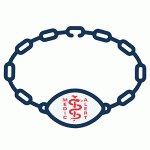Some of the most prevalent health conditions impacting women today are heart disease, stroke, diabetes, and Alzheimer’s disease. Of the 5 million Americans living with Alzheimer’s, more than two-thirds are women. In addition, each year stroke affects 55,000 more women than men. Heart disease has become the number one cause of death for women. While these statistics may sound scary, there are many effective ways to prevent and manage these conditions. Maintaining a healthy diet, weight, and exercise are just a few prevention methods. Medications and wearing a medical ID are effective steps to manage any condition you may be living with.
If you have a medical emergency, MedicAlert medical IDs for women can help first responders identify you, and emergency contacts. It will also alert them to any health conditions or medications that are important for your care. Having this information on hand can help provide the fastest, safest, and most accurate care. Whether you are in an accident or have another medical emergency. Fortunately, MedicAlert has a variety of women’s ID bracelets to suit every age, activity level, and style.
Who should wear MedicAlert medical IDs for women?
Medical IDs are an absolute necessity for people living with health conditions, but everyone can benefit from wearing one. Each year, nearly two million work-related injuries are reported, and millions of Americans are involved in accidents at home. And did you know that the highest percentage of car accidents happen during the morning and evening work commutes? Further, sports and recreational injuries account for millions of ER visits each year.
What are the best medical IDs for women?
MedicAlert medical IDs come in all shapes and sizes to suit a wide variety of lifestyles and occasions. The best medical IDs for women will depend on personal preference. The type of information you want to communicate and whether you prefer high-tech or no-tech, are all important considerations. A MedicAlert medical ID can be made of popular materials for women such as brilliant gold, shiny silver, durable nylon, and athletic silicon. Whichever style you prefer, MedicAlert has you covered.
The following are examples of some of the different types of medical IDs for women we offer:
Gold and silver medical ID bracelets
MedicAlert has more than 150 bracelet styles to choose from. Some of the most popular styles are our gold and silver women’s bracelets. Our best gold bracelets for women are 10K or 14K gold, and feature the globally-recognized MedicAlert emblem. The large emblem size allows extra room for engraving your vital identifying and medical information. This stylish women’s medical ID can easily transition from day to evening wear, without missing a beat.
Our sterling silver medical IDs for women are plated with rhodium to resist scratching or tarnishing. The rhodium coating also makes this women’s medical alert bracelet suitable for those with skin sensitivities. Our super-sized, globally-recognized emblem provides extra room for engraving your vital medical and contact information. This engraved women’s bracelet is versatile enough for everyday wear.
Nylon and silicone medical ID bracelets
Nylon and silicon are among the most popular material options for women’s sports bracelets. Our durable nylon sport band medical ID bracelets are designed to withstand the vigor of an active lifestyle. The MedicAlert emblem is made of rust-proof stainless steel and the band is offered in three sizes. Designed to protect you every day, the globally recognized MedicAlert emblem is on the front of this women’s medical alert bracelet, and your custom engraving is on the opposite side.
The silicon women’s sports bracelet is specifically designed for people who enjoy an active lifestyle. This trendy medical ID for women has a silicon band that features our waterproof, stainless steel MedicAlert emblem. The Sport Silicone Medical ID Bracelet provides protection and peace of mind during all of your everyday activities and adventures.
Fashion MedicAlert necklaces
For the woman who likes to wear jewelry or make a statement, MedicAlert has multiple options for daily wear and special occasions. Necklaces come in sterling silver, gold, and stainless steel, and each displays our globally recognized MedicAlert emblem with custom engraving on the opposite side. Some of our best women’s necklaces come in a variety of colors for engraving, and our necklace accessory allows you to add a medical ID to your own favorite necklace or chain.
The following are just a few fashion MedicAlert necklace styles:
- Charm Medical ID Accessory Stainless Steel
- Classic Ball Chain Medical ID Necklace (two colors)
- Classic Embossed Medical ID Necklace 10K Gold
- Classic Embossed Medical ID Necklace Sterling Silver
- Classic Heart Charm Medical ID Necklace Sterling Silver
- Classic Medical ID Necklace (five colors)
- French Elite Medical ID Necklace Sterling Silver
- Standard Medical ID Necklace (three colors)
Apple Watch ID
The MedicAlert medical ID for Apple Watch is made of rust-proof stainless steel and fits securely on your existing silicon Apple Watch band. Designed for active people who love their smartwatches, the Apple Watch ID for women is available in silver or black to match your watchband and your unique style.
Smart ID card and ICE TAG stickers
Smart medical IDs and ICE TAG stickers utilize proven QR code technology for quick access to your emergency contact and personal health information—anytime, anywhere. A quick scan from a smart phone camera opens up your detailed health profile, including medical conditions, allergies, medications, vaccinations, and more. The QR code is always up to date with the latest information in your MedicAlert health profile. Smart ID cards and ICE TAG stickers can be placed in your purse, wallet, or gym bag, on your clothing, and more.
Fillable wallet card
Fillable wallet cards are a simple and convenient option for people who want to ensure that their vital medical information is with them at all times. Designed for purses, wallets, and pockets, the MedicAlert fillable wallet card is the size of most credit cards, which provides plenty of space for your most important medical details, ICE contact, and any other information that needs to be communicated to first responders.
Shoe tag
MedicAlert shoe tags are perfect for super active individuals who prefer not to wear jewelry or those who may be sensitive to metal. In addition to attaching to shoes, our shoe tag medical IDs can be looped on a purse, gym bag, backpack, laptop bag, or messenger bag. We also have laced-up shoe tags that can loop through the laces of any shoe or sneaker. Made of solid stainless steel, the internationally recognized MedicAlert emblem sits prominently on the front of our shoe tag IDs, with your custom engraving on the reverse side. Our shoe tags are durable, lightweight, and can be easily worn every day.
Seatbelt ID holder
The MedicAlert seatbelt ID holder easily attaches to your car seatbelt for high visibility and quick access by first responders. The bright red body and clear instruction “MEDICAL INFO INSIDE” are attention-grabbers during an emergency. A pocket on the reverse side holds an ID card or document. Made of heavy gauge polyester, our seatbelt ID holder attaches securely with an adjustable Velcro closure so it stays in place. The seatbelt ID holder can also be used on a purse, backpack, gym bag, messenger bag, bike frame, and more.
Who should wear a medical ID?
Because an accident or injury can happen to anyone at any time, it’s important to wear a medical ID, whether you have a condition or not. A medical ID can help first responders identify who you are and who to contact if you are in an accident and unable to communicate. Simply put, a medical ID can provide peace of mind as you go about your everyday activities such as commuting to work and while at work, when you’re at the gym, while running or cycling, during domestic and international travel, while playing golf or other sports, and more.
While a medical ID should play a role in every person’s life, they are especially important for individuals living with a medical condition. A medical ID can:
- Help first responders and ER staff quickly access critical information about your medical condition and medications.
- Lessen the chance of medical errors in an emergency.
- Play a vital role in care plans if you are a caregiver to a loved one.
- Provide wandering support.
Whether you are living with a condition or want peace of mind, MedicAlert can be your voice if you are in an accident or have another medical emergency.
What conditions require a medical ID?
Medical IDs are for everyone, but they are especially beneficial for someone living with any type of medical condition. The following are some common physical and mental health conditions that require a medical ID.
Chronic medical conditions
Chronic medical conditions such as heart disease, lupus, arthritis, stroke, diabetes, and bleeding disorders such as hemophilia require special medications, and even injections such as insulin, which can have severe interactions with other drugs and substances. A medical ID lets first responders know that certain drugs should be avoided, ensuring accurate and safe treatment if you are in an accident or have another medical emergency.
If you are living with a bleeding disorder, even the smallest cut or bruise can cause severe bleeding. Having this information available can help avoid serious injuries during your handling, treatment, and care if you are unable to communicate with first responders and ER teams.
Allergies
Allergies to foods, medications, and other substances can cause a mild, moderate, or severe reaction. In some cases, a reaction can be fatal. For example, anaphylaxis can occur when a person who is allergic to latex comes in contact with it. Anaphylaxis can cause breathing difficulties, loss of consciousness, and even death. MedicAlert medical IDs for women will list all of your allergies if you use an auto-injectable device such as an EpiPen for severe reactions, and any other information important to your care.
Neurological conditions
Neurological conditions such as Alzheimer’s, dementia, autism, epilepsy, multiple sclerosis (MS), Parkinson’s disease, and amyotrophic lateral sclerosis (ALS), may require specific medications, treatments, mental health support, and/or assistive devices. A MedicAlert medical ID can provide access to this detailed information regarding your condition and care, which can help first responders and ER doctors avoid medical mistakes, ensuring the safest and most accurate care.
If you or someone you love are living with Alzheimer’s or dementia, a MedicAlert medical ID can provide wandering support. This helps first responders locate a person who may be lost and confused, it can help identify a person who might be found wandering, and it can help reconnect families with their loved one who has wandered off from their home or other safe environments.
How do you order a MedicAlert ID?
A MedicAlert medical ID can be a bracelet, necklace, wallet card, sticker, shoe tag, Apple Watch ID, seatbelt holder, or smart medical ID card. The front of a MedicAlert ID features our emblem, which is recognized by first responders around the world. A variety of MedicAlert medical IDs are available to match your own personal style and comfort level. Our bracelets, necklaces, and other medical IDs can protect you 24/7 by relaying your vital medical information to healthcare professionals, ensuring fast and accurate treatment during an emergency. Visit MedicAlert IDs to select a medical ID that’s right for you.
What should you engrave on a MedicAlert ID?
MedicAlert offers free custom engraving on all our medical ID products. The engraving on your medical ID should include any critical medical information that can protect and save your life if you are in an accident or have another medical emergency, including:
- Conditions and Medications.
- Emergency contact and designated physician information.
- Any additional medical information that needs to be communicated to first responders.
Medical IDs are for everyone and they don’t just benefit the person wearing it. A Medical ID can also be an invaluable asset to the family of the loved one.
Sources: American Physical Therapy Association (APTA); Centers for Disease Control and Prevention (CDC)-Emergency Department Visits; Centers for Disease Control and Prevention (CDC)-Injury Prevention & Control-Global Road Safety; Centers for Disease Control and Prevention (CDC)-National Center for Health Statistics; Insurance Information Institute (III); Johns Hopkins Medicine; Northwestern Medicine Resource Center.




